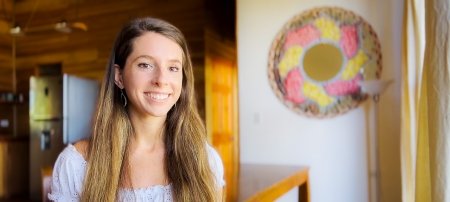Grad Students Receive DeVlieg Awards
Two College of Engineering students have each received a $5,000 DeVlieg Foundation Research Award in Wildlife and Environmental Studies to pursue two very different projects relating to water and the environment.
Matt Van Grinsven, an MS student in geology, is studying groundwater discharge sites along the Salmon Trout River in hopes of discovering keys to successfully reintroducing coaster brook trout throughout their traditional range.
Valerie Fuchs, who is pursuing both MS and PhD degrees in environmental engineering, is studying nature-based systems of wastewater treatment, specifically, how constructed wetlands could be designed to best remove nitrogen from effluent.
The Salmon Trout, in Marquette County, is the only remaining spawning river on the south shore of Lake Superior used by the once-abundant coaster brook trout. Coasters—large, lake-running brook trout that spawn in their natal streams—were decimated in Michigan about 100 years ago because of their preferred habitat: shallow waters just off the shore of Lake Superior, perfect for easy fishing.
Coasters once spawned in 80 rivers and streams around the lake. That number has dwindled to 11, and efforts to reintroduce them have been notable by their lack of success.
Coaster spawning success may be related to sites where groundwater discharges into the surface water. Van Grinsven will investigate groundwater interactions with the Salmon Trout River to find out what conditions best support spawning and determine what type of habitat would be best suited for coaster brook trout restoration.
Fuchs is investigating engineered wetlands as a sustainable alternative to conventional wastewater treatment, which is expensive and consumes a great deal of energy. In particular, she is interested in nitrogen removal.
Nitrogen is a major component of both wastewater and agricultural runoff; as a fertilizer, it can promote algae growth and choke streams and lakes. Wetland plants can pull nitrogen out of the water and lock it in their tissues. Fuchs has developed an experiment to compare two different designs, one with wastewater introduced at the soil surface and the other with wastewater introduced deep in the soil, to see which is most effective in removing nitrogen.
The DeVlieg Foundation was established in 1961 by Charles DeVlieg, the founder of the DeVlieg Machine Company, of Royal Oak. Its primary mission is to promote educational programs in the areas of engineering and natural resources.
Michigan Technological University is a public research university founded in 1885 in Houghton, Michigan, and is home to more than 7,000 students from 55 countries around the world. Consistently ranked among the best universities in the country for return on investment, Michigan’s flagship technological university offers more than 120 undergraduate and graduate degree programs in science and technology, engineering, computing, forestry, business and economics, health professions, humanities, mathematics, social sciences, and the arts. The rural campus is situated just miles from Lake Superior in Michigan's Upper Peninsula, offering year-round opportunities for outdoor adventure.




Comments